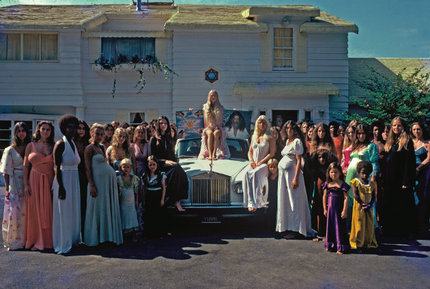Review: THE SOURCE FAMILY - Spiritual Utopia Or Exploitive Cult?

There are also those who experienced emotional and sexual trauma as a result of the group, minors who were married in their early-teens to avoid statutory rape laws, wives who were discarded in favor of a group-sex mentality that evolved, fathers who left when their child got sicker and sicker as a result of the family's strict no-medicine policy. And actually, some of these are the same people who professed the aforementioned miracles.
Indeed, the question of whether Jim Baker's radical hippie experiment was a well-intentioned and generally beneficial community or a dangerous, manipulative cult lurks under the surface of the tight narrative in The Source Family. The film seems to sort of suggest both, though the state-of-mind and beliefs of individual viewers will play a large role in how they interpret the events laid out in the film.
To it's credit, laying out events is mostly what the film focuses on. Rather than bringing in sociologists, psychoanalysts and PHD students in occult studies to hypothesize about the truth, it simply tells the story of the family's origin and demise using interviews with ex-members and a wealth of super 8 films and still-photos from the community itself. It's a wise choice since the ambiguity about the truth makes the film far more interesting, and because the narrative itself is so tight and compelling that interrupting it with expert analysis would have killed the pacing and muddled the story.
At the center of the experiment is Jim Baker, later Father Yod, a hulking, handsome and charismatic father-figure with a huge Victor Hugo beard and intense, burning eyes. In other words, the perfect cult leader. From the very beginning, Baker is full of problematic contradictions. He grew up popular, well liked, and extremely intelligent. He successfully ran several famous restaurants, one of which even became a franchise. He was also convicted of killing two men, and claimed that he robbed ten or so banks in order to get the money to start said restaurants.
Soon he opens a vegetarian restaurant called The Source, frequented by everyone from Steve McQueen to John Lennon to local hippies. From the restaurant, the family evolves, and soon dozens of beautiful young people are all living in one giant house, dressed in white robes and meditating every morning under the leadership of Baker. As one person puts it, it was "sex, drugs and rock n roll as a religious formation." From these salad days that everyone remembers fondly, the family evolves in the textbook direction of a cult. Rules are reversed, mostly for to allow Baker to have multiple sex partners. New, stricter rules are put into effect. The restaurant, along with concerts become recruitment tools. By the end of the movie, the remaining members have fled Los Angeles to Hawaii, where they find themselves serving as armed watchman facing suspicious, militant locals.
Thanks to the fact that Baker insisted on recording and documenting so much, the film is richer and more visually dynamic than it might have otherwise been. Rather than filming empty spaces and re-enactments as filler between the talking head-interviews, Directors Maria Demopoulos and Jodi Wille use audio-recordings, a plethora of photos and just as much Super 8 footage. The result is a completely immersive documentary that's doubly interesting simply because of some of the fascinating amateur footage on its own.
About those talking heads though: They go by their Source names like Isis and Electricity and most, even all these years later, seem to lead a sustainable, new-age type lifestyle. They all speak eloquently, intelligently and, it seems, honestly, but the choice to tell the story exclusively through the key willing members begs the question of what stories and which sides we're not hearing, especially during the final scenes where most of the interview subjects wax romantic about their time in the family, despite some seriously troubling issues. No one shies away from the darker edges of the experience, but there's something a bit alarming about the fact that nearly all of the interviewees seem to think that their time spent serving Baker was for the best. Interview bias or cognitive dissonance? Maybe I'm in no place to judge.
Nevertheless, The Source Family is a fascinating, intimate and often startling film that explores the transition from utopia to cult without condescending to provide easy answers. Provided you don't have a strong aversion to hippie culture and mysticism -- the film is wall to wall with footage of the groovy family members backed by psychedelic music -- you'll certainly find something of interest here. Again though, what that something is and how you react to it will vary considerably.
The Source Family
Director(s)
- Maria Demopoulos
- Jodi Wille
Cast
- Ahom Aquarian
- Isis Aquarian
- Elena Michaels
- Father Yod

Do you feel this content is inappropriate or infringes upon your rights? Click here to report it, or see our DMCA policy.






